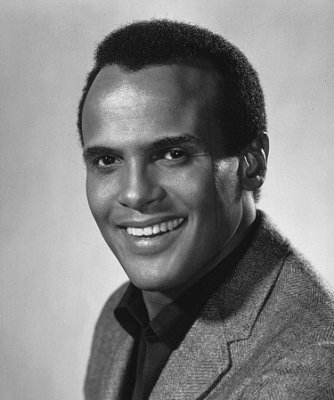Harry Belafonte was born on March 1, 1927, in New York City to parents who are of Jamaican descent. He attended George Washington High School, where he was on the track team. He was sent to Jamaica, his mother’s native country, to live with relatives. His mother worked as a dressmaker and a house cleaner, and his father served as a cook in the British Royal Navy.
One of the most successful Caribbean American pop stars in history, he was dubbed the “King of Calypso” for popularizing the Caribbean musical style with an international audience in the 1950s.
Belafonte was an early supporter of the civil rights movement in the 1950s, and one of Martin Luther King Jr.’s confidants. Throughout his career he has been an advocate for humanitarian causes, such as the anti-apartheid movement and USA for Africa.
When he returned to New York City, he attended George Washington High School after which he joined the Navy and served during World War II. In the 1940s, he was working as a janitor’s assistant in NYC when a tenant gave him, as a gratuity, two tickets to see the American Negro Theatre.
He fell in love with the art form and also met Sidney Poitier. The financially struggling pair regularly purchased a single seat to local plays, trading places in between acts, after informing the other about the progression of the play.
Belafonte got married in 1948 to Marguerite Byrd they have two daughters together, Adrienne and Shari, but they later got divorced in 1957. March of that same year he then married again to Julie Robinson they also share two children, David and Gina.
In 1985, he helped organize the Grammy Award-winning song “We Are the World”, a multi-artist effort to raise funds for Africa. He performed in the Live Aid concert that same year. In 1987 he received an appointment to UNICEF as a goodwill ambassador.
He owns his own music publishing firm and film production company. He won a Tony award in 1953, a Donaldson award in 1953-1954, a Show Business award in 1954, a Diners’ Club award in 1955-1956, and an Emmy award for “Tonight with Belafonte”.
He was a Kennedy Centre Honouree in 1989, he was awarded the National Medal of Arts in 1994, and he won a Grammy Lifetime Achievement Award in 2000.

He achieved widespread attention for his political views in 2002 when he began making a series of negative comments about President George W. Bush, his administration and the Iraq War. He was awarded a Star on the Hollywood Walk of Fame for Recording at 6721 Hollywood Boulevard in Hollywood, California.
He helped introduce South African singer Miriam Makeba and Greek singer Nana Mouskouri to American audiences. A civil-rights activist, he was also active in charitable work. For the next fifteen years, Belafonte continued to pursue cinematic activity, though rarely signed for fictional roles.
He restricted his involvement for the remainder of the nineties (and into the 2000s) to documentary work and concert films, with participation, often as the host, narrator, or central performer, in such projects as Roots of Rhythm (1997).
While best known for his success as a singer and an actor, Belafonte continually used his public stature to advance the black freedom struggle. As one of the country’s most popular entertainers during the 1950s, Belafonte appeared with Coretta King and Duke Ellington at the “Salute to Montgomery,” a December 1956 fund raising event in New York.